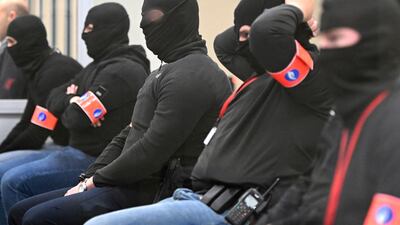A stand-off has enveloped the long-awaited 2016 Brussels bombing trial which has faced a rocky start as the main defendants of the triple suicide attacks that killed 32 people have refused to comply with the security procedures put in place.
Six defendants — Ali El Haddad Asufi, Mohamed Abrini, Osama Krayem, Sofien Ayari, Bilal El Makhoukhi and Herve Bayingana Muhirwa — walked out on Monday as the trial entered its second week. The boycott is over measures which include strip searches twice a day, lawyers have told The National.
A lawyer of seventh defendant Salah Abdeslam said he was not attending the hearing because he had a cold.
Prosecutors are currently completing a readout of a 450-page arraignment, which they have so far mostly set out in the absence of defendants.
The seven men walked out at the start of Thursday's hearing after Asufi accused police of strangling him as he exited his cell. Local media reported that the police accused Asufi of rebelling.
“It’s my client’s wish to not attend hearings until conditions are relaxed,” one of Asufi’s lawyers, Jean-Christophe de Block, told The National.
Hearings are not held on Fridays.
Five defendants exited the courtroom on Wednesday to protest against “humiliating” security measures during their transfer from prison to the court.
The five men — Abdeslam, Abrini, Krayem, Asufi and Ayari — have already been sentenced following a 10-month-long trial in France over terrorist attacks in November 2015 in the French capital which killed 130 people.
Security measures include loud music played through earphones, blindfolds, toilet cameras and cavity searches involving squatting, both before leaving and after returning to their cells.
The accused are detained in a prison in the city of Haren, roughly 4km away from the courtroom, which is located in former Nato headquarters north of Brussels.
Defendants are legally obligated to enter their shared glass box at the start of hearings but can then leave if they wish to.
Muhirwa’s lawyer Vincent Lurquin told The National that, such incidents may “jeopardise” the trial.
He argued that there was little chance of defendants evading security in the heavily patrolled Justitia building.
“There are hundreds of policemen, and two policemen behind them all the time,” he said. “I don’t understand how they could bring anything in with them to prison.”
Mr Lurquin said that he wanted the trial to move forward. “We must create the conditions for [defendants] to talk.”
Prosecutors say that Muhirwa gave essential logistic help to Najim Laachraoui, Ibrahim El Bakraoui, and Khalid El Bakraoui, enabling them to detonate three bombs in the Brussels metro and nearby Zaventem airport on March 22, 2016.
The attacks were claimed by ISIS.
Muhirwa was not a defendant in the French trial.
Lawyers have asked the Justice Ministry to relax the transfer security measures. Mr Lurquin said that if they do not receive an answer by Friday, they would file a complaint at the Brussels court “to ban such practices.”
“I hope that the Justice Ministry will intervene before that,” he said.
Presiding judge Laurence Massart on Wednesday also wrote to the Justice Ministry, noting the complaints made by defendants. She said that she does not have the authority to make changes to their transfer conditions.
She called on Thursday for dialogue to return “between the police, concerned ministries, and the prosecution so that this trial can be held in the best conditions possible”.
Philippe Vansteenkiste, director of Victims-Europe, a non-profit Brussels-based organisation created in the aftermath of the attacks, previously told The National that such disruptions were to be expected.
“You have to understand that this is a popular jury and what they are trying to do is to impress the emotions of the jury,” he said.
The jury of 12 was picked at random from a pool of 1,000 Belgians aged between 28 and 65. Behind the jury sit 24 replacements.
Two of the accused, brothers Smail Farisi and Ibrahim Farisi, have been attending hearings as free men. A tenth defendant, Osama Atar, is believed to have been killed fighting with ISIS in Syria in 2017.


